
 Flash News
Flash News
The Supreme Court returns Arbër Veliaj's appeal for retrial
Call Center raided in Tirana/One of the organizers and 6 employees in handcuffs
Fight with crowbars and gunfire in Tirana, police official reaction
"We protect the vote", Berisha reveals the slogan of the May 16 protest
Accident at Tujani Stairs, two young people lose their lives
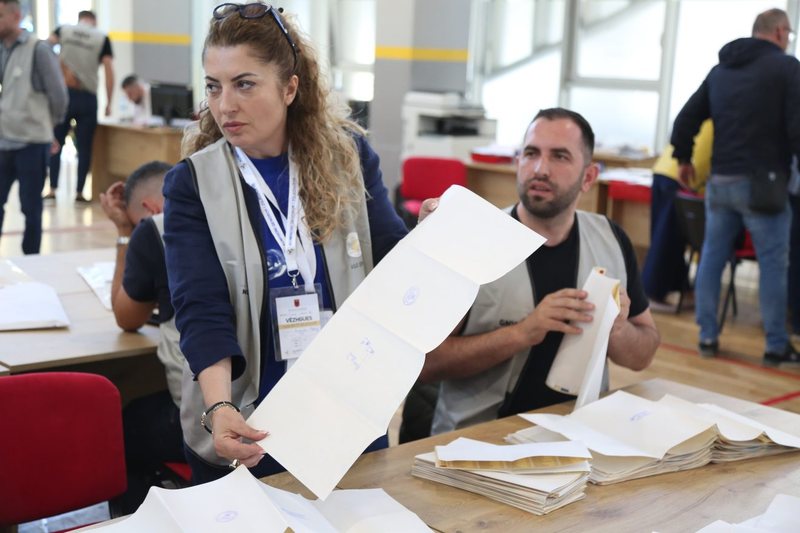
Three of the small parties competing in Sunday's elections appear to be securing parliamentary mandates, a fundamental shift in Albanian politics that could pave the way for breaking the duopoly system created by the Socialist Party in government and the Democratic Party in opposition, as well as laying the foundations for challenging the clientelistic politics fossilized by these political forces over the last two decades.
The vote counting process on Sunday has not yet been completed, but it is already clear that eight small parties out of eleven competitors have received around 140,000 votes domestically and around 15,000 from emigrants, for a total of 155,000 votes. The figures are not final because for domestic votes, another 2% of the ballot boxes remain to be counted, while for emigrant votes, over 70% remain to be counted. The process of counting emigrant votes is currently blocked. Although almost 48 hours have passed since the closing of the ballot boxes, the turnout figures are not yet available, but extrapolation of the declared data suggests that 1.66 million citizens voted domestically and abroad, and of these, 9.4% voted for one of the challenging parties.
Parliamentary mandates
Many individuals and groups have attempted in the past to break the duopoly established two decades ago in an agreement between Sali Berisha, then prime minister, and Edi Rama, then mayor and leader of the opposition Socialist Party.
Ben Blushi with the Libra party, after breaking away from the Socialist Party, received almost 20 thousand votes in the 2017 elections, but won zero parliamentary mandates. In 2021, the then newly created Nisma Thurrje received 10 thousand votes and zero mandates. Several independent candidates, three of whom were supported by the Kosovo Self-Determination Movement, did not even come close to a mandate.
The situation is expected to be very different these elections, where three of the small parties are expected to receive a minimum of 3 and a maximum of 7 mandates depending on the final result.
The “Albania Initiative Becomes” coalition has so far secured 3.5% of the votes within the country and 8.4% of the votes of emigrants. This party has so far secured one mandate in Tirana. It is still holding out hope for a second mandate in Fier, for which it is close, and one in Vlora. The hopes for mandates in these two districts seem to depend on the better performance that this party has among emigrants from these two districts. NSHB has received 13% of the votes from emigration that have been counted so far for the Vlora district and 10% for the Fier district. In contrast, in the votes within the country, it has received 5.4 and 4.6% respectively.
Businessman Agron Shehaj's "Mundësia" party has so far secured one mandate in the Tirana Region, while a second mandate is still in the running. Mundësia has so far received around 42,000 votes, which are expected to increase by the end of the counting.
"The Together Movement" has so far received over 20 thousand votes at the national level. It is close to winning a mandate in the Tirana Region, where it has received almost 2.7% of the votes. It will take many more days to learn the final result because about 150 thousand votes from emigration remain to be counted.
Legal duopoly
Since 1991, the two main parties, the Socialist Party, heir to the Labor Party, and the Democratic Party, which in a significant number of its leaders broke away from the Labor Party, have managed power with the help of several parties on each wing, small parties used sometimes as bait for dissatisfied voters and other times as electoral machines. In 2001, when the then Socialist leader, Fatos Nano, expressed dissatisfaction with the small parties allied to the SP, he described them as “taxi parties”, meaning ordinary tools used according to the needs of the big parties in return for a payment.
Throughout the elections that followed, the DP and SP and their formal allies, who changed names, managed the country's electoral processes and usually denied parties that emerged outside their will, whether people who broke away from them or new political initiatives, a fair and equal competition.
The peak, however, was in 2008, when an agreement between the DP and the SP installed a regime of multiple disadvantages for small parties in general, targeting the Socialist Movement for Integration in particular. In one of the ugliest elements of the agreement, it was required that, in case a group of people wanted to create a new political party, they had to collect notarized declarations from 20 thousand citizens. Given that notarized declarations have a legal cost of 200 lek, the cost of establishing a new party was thus set at almost 40 thousand euros.
The main disadvantage was created by the division of the country into 12 electoral regions of varying sizes, in most of which small parties had no real chance of winning seats. In addition to the division in question, the obligation was imposed that each party compete in all regions and with full lists of candidates. The obligation was halved, meaning that small parties were required to compete with 70 candidates instead of 140, if they agreed to compete as part of coalitions of two large parties.
The absurdity of the scheme was noticed in 2017, when MEGA, a party of the Greek minority in Albania, was forced to compete throughout the country and filled the lists with whatever it could while hoping for a mandate only in a few limited areas where the community that this party intended to represent resides.
Diskretitimi i thellë i dy forcave të mëdha politike nga skandalet e njëpasnjëshme korruptive si dhe lufta e shumë aktivistëve kundër padrejtësive sistemike duket se krijoi dritaren e vogël, përmes të cilës, tre parti të reja po hyjnë në parlament.
Më pak mandate nga sa u takon
Sipas Kushtetutës së Republikës së Shqipërisë, përfaqësimi në parlament duhet të jetë sa më i përafërt me votën popullore, ndonëse gjerësisht pranohet se kjo nuk është e mundur 100 për qind. Sistemi i zgjedhur nga PD-PS në fakt ka shkaktuar që nga ajo kohë “vota të djegura”, vota që praktikisht nuk janë përfaqësuar në parlament. Zgjedhjet e së dielës nuk ndryshojnë nga të shkuarat në këtë drejtim, ndonëse në të shkuarën, “viktima” të sistemit kanë qenë partitë makineri elektorale të llojit LSI apo PDIU.
Të tetë partitë e vogla sfiduese në zgjedhjet e së dielës, (pra garuesit pa PS, PD e aleatë dhe PSD), pritet të marrin brenda vendit 142 mijë vota, të cilat përbëjnë rreth 10% të votave dhe teorikisht duhej të prodhonin rreth 14 mandate. Por fakti është që këto parti pritet të marrin minimumi 3 dhe maksimumi 7 mandate për shkak të padrejtësisë sistemike. Votat e papërfaqësuara të këtyre shqiptarëve u kalojnë si mandate dy partive të mëdha. Kështu, Partia Socialiste, e cila mori 52% të votës popullore, pritet të marrë 82 mandate ose gati 56% të parlamentit, ndërsa opozita kryesore pritet të marrë 50 mandate ose 36% të parlamentit, ndërsa ka marrë 35% të votave. Me pak fjalë, nga të 11 mandatet që PS dhe PD ia ka mohuar të vegjëlve me sistemin e proporcionalit rajonal, 10 duket se janë fituar nga Partia Socialiste dhe një nga Partia Demokratike. Në rast se sistemi do të ishte proporcional i pastër kombëtar, PS do të merrte 73 mandate, PD 49, Nisma Shqipëria Bëhet 4.9 mandate, Mundësia 4.3 dhe Bashkë afërisht 2 mandate. Me sistem proporcional kombëtar, Koalicioni Euroatlantik, që mori 1.36% të votave e kishte të sigurt një mandat.
Tirana goditi të mëdhenjtë
Zgjedhjet e së dielës duket se kishin përcaktues votuesit e Qarkut Tiranë. Partitë e vogla morën sëbashku afërsisht 143 mijë vota në rang kombëtar ose 10% të votave të vlefshme në rang kombëtar, por në Tiranë morën 13.7% të votave.
Në zgjedhjet e së dielës, në Tiranë u hodhën afërsisht 435 mijë vota, pothuajse 50 mijë më pak se sa katër vjet më parë. Partisë Socialiste i humbën 26 mijë vota ndërsa Partisë Demokratike i humbën më vete 35 mijë vota. Të 28 mijë votat që LSI pati marrë më 2021 në Tiranë dhe që teorikisht duhej të gjendeshin në thesin e Koalicionit Shqipëria Madhështore nuk duken gjëkundi. PD dhe LSI sëbashku kanë humbur pothuajse 64 mijë vota. Partitë e vogla të marra sëbashku në Tiranë kanë marrë gati 80 mijë vota. Katër vjet më parë, partitë e vogla, përfshirë Nismën Thurrje, apo Bindja Demokratike, patën marrë sëbashku 15 mijë vota.
Model tjetër
The small window to Parliament, opened by small parties in Sunday's elections, is likely to mark the start of a different kind of politics than we have seen over the past two decades. Because, starting in 2009, when the SMI crossed the political rainbow and entered a governing alliance with the DP, the dominant policy has been that of maximum use of state economic resources to secure votes, manipulation of the media, cooperation with organized crime to buy votes and blackmail voters. In short, starting initially with small parties, clientelistic politics expanded to the large parties, the DP and the SP, until it completely fossilized, which has been observed throughout the last three electoral campaigns for parliamentary elections, campaigns that international observers describe as "rather low-key," a figurative expression that in this case implies the absence of real political debates.
In this context, the small parties, with 10% of the valid votes and with every vote secured thanks to the citizens' demand for representation outside the clientelistic politics or identity politics inherited from the communist tyranny and the massive violation of human rights by the first post-communist government, suggest that a new beginning has been marked in Sunday's elections, a beginning that has been slightly overshadowed by the sensational victory of the Socialists or the numerous electoral violations observed by locals and internationals. It is likely that the new parties entering parliament will have the opportunity to demonstrate their capabilities, giving citizens more choices in the upcoming elections.
The other big change seems to be internal democracy. The Albania Becomes Initiative competed with open lists, which it imposed on itself, while the Together Movement placed Redi Muçi, an activist and not the chairman Arlind Qori, first on the Tirana list, through a vote within the party structures. A number of citizens appeared in public for the first time with the policy of physical presence, from the parties that are entering parliament and from others that did not, with face-to-face communications, with a confrontation of ideas and away from the model of the irreconcilable enemy installed by the major parties or of the voter as an institutionalized client with the patronage system.
Latest news

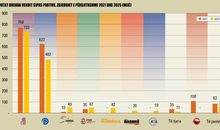

SPAK and BKH action in Shkodra, some escorted for electoral crimes
2025-05-14 14:05:26
This type of food can increase the risk of a deadly disease
2025-05-14 13:54:51


EU adopts new sanctions package against Russia
2025-05-14 13:30:51
Albanians' spending on private education reached 200 million euros in a decade
2025-05-14 13:20:22
The poorest president in the world passes away
2025-05-14 13:10:33
Australia, death toll from melioidosis outbreak in Queensland rises to over 30
2025-05-14 13:01:07
The Supreme Court returns Arbër Veliaj's appeal for retrial
2025-05-14 12:52:25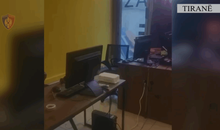
Call Center raided in Tirana/One of the organizers and 6 employees in handcuffs
2025-05-14 12:40:42
Kidnapping and threats in Astir, 29-year-old arrested
2025-05-14 12:34:57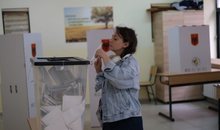
Free and fair? Albania's elections reflect a worrying global trend
2025-05-14 12:28:34
Facebook's Zegjineja also a Member of Parliament
2025-05-14 12:16:40
Diaspora vote, Nuri: Work done by patronage, strong shadows of suspicion
2025-05-14 12:07:33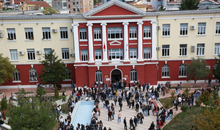

Fight with crowbars and gunfire in Tirana, police official reaction
2025-05-14 11:41:10
Fraud or manipulation?! Diaspora envelopes in Kukës are increasing by counting
2025-05-14 11:29:48

"We protect the vote", Berisha reveals the slogan of the May 16 protest
2025-05-14 11:11:02
Electoral crime/ SPAK publishes figures: 7 people arrested
2025-05-14 11:03:08
Accident at Tujani Stairs, two young people lose their lives
2025-05-14 10:51:01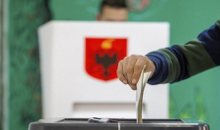
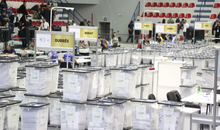
"SP gets 84 mandates", how did Open Data predict the results of May 11?
2025-05-14 10:28:28

Tirana Court Sentences Dan Hutra, Serial Killer of Women, to Life in Prison
2025-05-14 10:10:55
List of MPs that Elbasan is bringing to the Assembly
2025-05-14 10:01:46
"Zjerm" leads Albania to the Eurovision 2025 final
2025-05-14 09:50:29

New parties open a window to Parliament for the first time
2025-05-14 09:31:45
Rama delivers a speech at Skanderbeg Square today
2025-05-14 09:31:34
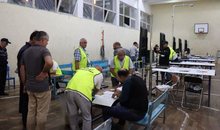
Shkëlqim Shehu wins mandate, most voted in Kukës from DP
2025-05-14 09:11:58
Votes for candidates, names from the open list entering the Assembly in Lezha
2025-05-14 09:03:23
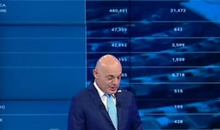
How was the vote stolen in London? Hasjani tells it live
2025-05-14 08:37:52
About 80 thousand envelopes from the diaspora are being counted, results so far
2025-05-14 08:30:37
Foreign exchange/ How much foreign currencies are bought and sold today
2025-05-14 08:13:53

4 cars collide in Tirana, after the accident the drivers fight with levers
2025-05-14 07:58:20
Weather forecast for today
2025-05-14 07:40:35
HOROSCOPE/ Here's what the stars have predicted for each sign
2025-05-14 07:20:57
Morning Post/ In 2 lines: What mattered yesterday in Albania
2025-05-14 07:06:32
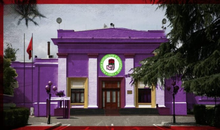
SP towards full legislative control, what does this mean for democracy?
2025-05-13 22:36:52

'Braçeee, Braçeee', the counter grabs the attention of CEAZ 5, laughter erupts
2025-05-13 21:55:09
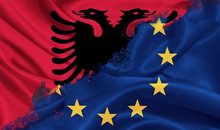
Tirana hosts European leaders on May 16, summit agenda revealed
2025-05-13 21:11:22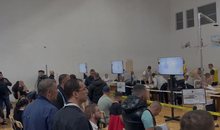
Counting closes in Vlora, PS gets 9 mandates, DP remains with 3
2025-05-13 20:59:14
DP representative at the CEC: SP votes in the diaspora, filled by the same hand
2025-05-13 20:50:55
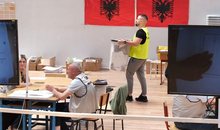
BIRN: European Union concerned about violation of electoral standards in Albania
2025-05-13 20:21:37
A house for a vote? Soft loans for the administration before the elections
2025-05-13 20:10:01
DP-ASHM secures two mandates in Kukës, Isuf Çelaj the most preferred voter
2025-05-13 20:01:22
Poll/ Were the May 11 elections fair?
2025-05-13 19:27:22
Elections 2025/ Counting of diaspora votes continues, results
2025-05-13 19:21:11
Lapaj: We are close to a mandate in Fier, we will take it from the SP
2025-05-13 19:17:33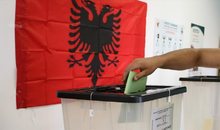
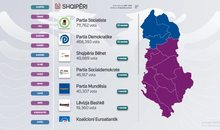
82 mandates, a reward for what?
2025-05-13 18:36:46
International cyber fraud network hit, seizures and checks in Tirana
2025-05-13 18:17:08








"Electronic Shkodra" takes to the Eurovision 2025 stage tonight
2025-05-13 16:02:42
Discover the 5 reasons to take folic acid even if you are not pregnant.
2025-05-13 15:45:50
Lack of independent media undermined elections, observers say
2025-05-13 15:34:36
The first ballot boxes for candidates in Rrogozhina are being counted.
2025-05-13 15:31:42



Albania has the most underdeveloped agro-industry in the region, Kosovo is first
2025-05-13 14:43:43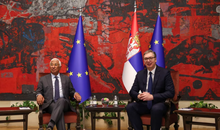

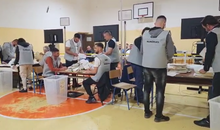
Preferential vote counting concludes in CEAZ 69, Skrapar
2025-05-13 14:23:43
The Director of the ARA appears before SPAK
2025-05-13 14:15:18
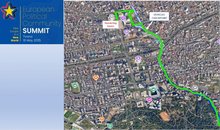

Berisha calls for protest on May 16: Elections were dictated by criminal gangs
2025-05-13 13:56:19
Aida Hajnaj is excluded from re-running for a second term as head of the BKH
2025-05-13 13:50:26
Accident near 9-year-old school in Korça, car hits student
2025-05-13 13:40:23

Lezha Court releases Elda Hoti's husband
2025-05-13 13:24:50


"Toyota Yaris" file/ SPAK demands 6 years in prison for lawyer Radovan Çela
2025-05-13 12:53:16
Conflict between observers at a CEAZ in Tirana, 7 escorted
2025-05-13 12:44:39
Counting closes in Kamëz, DP leads
2025-05-13 12:37:10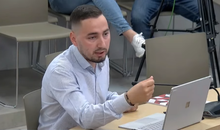

Shkodra, family members find 65-year-old woman hanged
2025-05-13 12:21:03
Alimehmeti: Albania cannot go to Europe with these elections
2025-05-13 12:12:27

Durres Prison 'bastion' of the Socialist Party
2025-05-13 11:49:41
